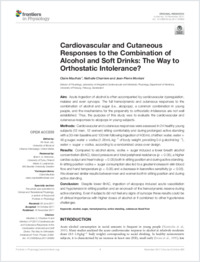Cardiovascular and cutaneous responses to the combination of alcohol and soft drinks: the way to orthostatic intolerance?
- Maufrais, Claire Division of Physiology, Department of Medicine, University of Fribourg, Switzerland
- Charrière, Nathalie Division of Physiology, Department of Medicine, University of Fribourg, Switzerland
- Montani, Jean-Pierre Division of Physiology, Department of Medicine, University of Fribourg, Switzerland
-
10.11.2017
Published in:
- Frontiers in Physiology. - 2017, vol. 8, p. 860
English
Aim. Acute ingestion of alcohol is often accompanied by cardiovascular dysregulation, malaise and even syncope. The full hemodynamic and cutaneous responses to the combination of alcohol and sugar (i.e. alcopops), a common combination in young people, and the mechanisms for the propensity to orthostatic intolerance are not well established. Thus, the purpose of this study was to evaluate the cardiovascular and cutaneous responses to alcopops in young subjects. Methods. Cardiovascular and cutaneous responses were assessed in twenty-four healthy young subjects (twelve men, twelve women) sitting comfortably and during prolonged active standing with a 30-min baseline and 130min following ingestion of 400mL of either: water, water+48g sugar, water+vodka (1.28mL.kg-1 of body weight, providing 0.4g alcohol.kg-1), water+sugar+vodka, according to a randomized cross-over design. Results. Compared to alcohol alone, vodka+sugar induced a lower breath alcohol concentration (BrAC), blood pressure and total peripheral resistance (p<0.05), a higher cardiac output and heart rate (p<0.05) both in sitting position and during active standing. In sitting position vodka+sugar consumption also led to a greater increase in skin blood flow and hand temperature (p<0.05) and a decrease in baroreflex sensitivity (p<0.05). We observed similar results between men and women both in sitting position and during active standing. Conclusion. Despite lower BrAC, ingestion of alcopops induced acute vasodilation and hypotension in sitting position and an encroach of the hemodynamic reserve during active standing. Even if subjects did not feel any signs of syncope these results could be of clinical importance with higher doses of alcohol or if combined to other hypotensive challenges.
- Faculty
- Faculté des sciences et de médecine
- Department
- Département de Médecine
- Language
-
- English
- Classification
- Biological sciences
- License
-
License undefined
- Identifiers
-
- RERO DOC 306273
- DOI 10.3389/fphys.2017.00860
- Persistent URL
- https://folia.unifr.ch/unifr/documents/306210
Statistics
Document views: 100
File downloads:
- pdf: 152
